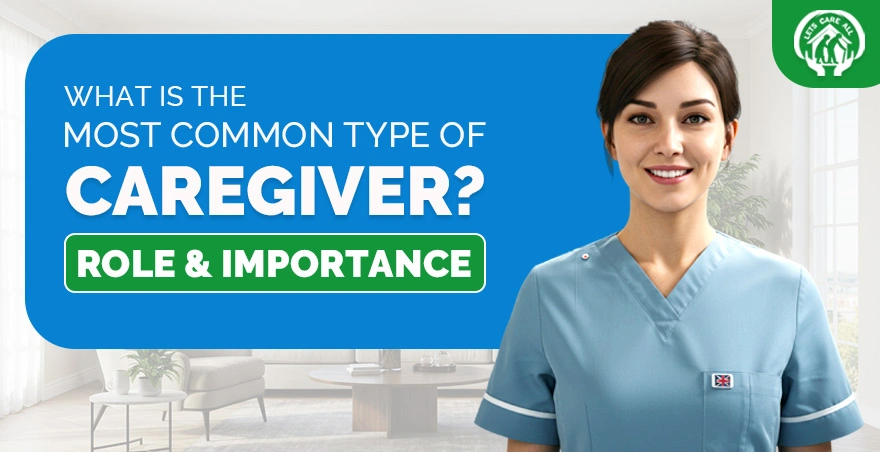- Southall, London
A call can make a DIFFERENCE
- Southall, London
A call can make a DIFFERENCE
A call can make a DIFFERENCE
Getting to Know Us!
Company Information and Customer Policies

As the world becomes more health-conscious and diseases spread more widely, caregiving has become a vital part of daily life for millions. Many people rely on the support of others due to ageing, illness or disability. Whether in a care home, hospital, or personal room, caregiving ensures that people with ageing or any disability receive the help they need to live with dignity.
However, when people hear the term caregiver, they often think of a nurse or a support worker in a uniform. While these professionals play a vital role in the healthcare sector, they are not the most common type of caregiver. In reality, most common caregiving is done quietly and informally in personal settings. Understanding the most common type of caregivers is not only important for recognising their contributions but also for support systems that address their unique challenges.
In this article, you will explore what is the most common type of caregiver.
A professional caregiver actively provides care and support to individuals with medical, physical, or emotional needs, using their training and experience. These caregivers can work in hospitals, care homes, and private settings. Professional caregivers have many responsibilities, which include helping with daily activities such as bathing, dressing, meal preparation, medication management, and mobility assistance. Their role is as home health aides, nursing assistants, personal care assistants, and support workers.
There are different types of caregiving, each with its unique responsibilities and challenges. This role can vary widely depending on the needs of the people and the setting in which care is given. However, here we discuss 4 types of caregivers that are vital in every care environment
Family caregivers are also called the informal caregivers. These are usually family members, relatives or close friends who provide unpaid care to a loved one in need. They assist patients with daily activities such as bathing, dressing, meal preparation, and transportation, and they also offer emotional support. Often stepping into the role out of love or necessity, family caregivers are crucial in helping individuals remain in their homes and maintain a sense of independence and dignity.
Independent caregivers do not work with any organisation. The care recipient or their family privately hires these caregivers, rather than working through a professional agency. While they often have relevant experience or training, they typically work on flexible terms and provide personalised care services such as personal hygiene assistance, medication reminders, companionship, and mobility support.
Professional caregivers are trained and experienced caregivers working with healthcare agencies, care homes, or private employers. They are paid caregivers whose responsibilities range from assisting with daily living tasks to providing medical care under supervision. This group includes home health aides, certified nursing assistants, and personal support workers offering reliable and regulated care services.
Respite caregivers provide temporary care to give regular caregivers, often family members, a much-needed break. Depending on the need, this type of care can be scheduled for a few hours, days, or often longer. Respite caregivers help prevent caregiver burnout and ensure continuous, quality care is available for the person in need, even when the primary caregiver is unavailable.
The most common type of caregiver is the informal caregiver, who is often the family caregiver. These individuals are typically family members, such as spouses, adult children, siblings, or even close friends, who provide unpaid care to someone with a chronic illness, disability, or age-related condition. Unlike professional caregivers, family caregivers usually have no formal training and take on this role out of love, duty, or necessity. They assist with daily activities like bathing, dressing, cooking, and medication management. While also offering emotional support and companionship.
Additionally, informal caregivers are vital in home-based care, helping loved ones maintain independence and dignity in familiar surroundings. They provide necessary day-to-day support that enables care recipients to remain in their homes, maintain independence, and avoid costly institutional care. Although their contribution is emotionally and economically invaluable, many people fail to recognise and support them despite being the backbone of long-term care systems worldwide.
Moreover, their presence can improve recovery rates, reduce hospital readmissions, and enhance the overall quality of life for the care recipient. In many healthcare systems, their contribution fills critical gaps, making family caregivers indispensable to families and society.
Well, the caregiver should be someone who possesses a combination of compassion, patience, responsibility, and resilience. Caregiving requires a person who is empathetic and kind, able to understand and respond to the emotional and physical needs of others. Patience is a vital component, especially when caring for individuals with chronic illnesses, cognitive impairments, or mobility issues.
Moreover, caregivers should also be reliable and organised, capable of consistently managing daily routines, medications, and appointments. Plus, caregivers must be emotionally strong and adaptable, as the role can be demanding and unpredictable.
